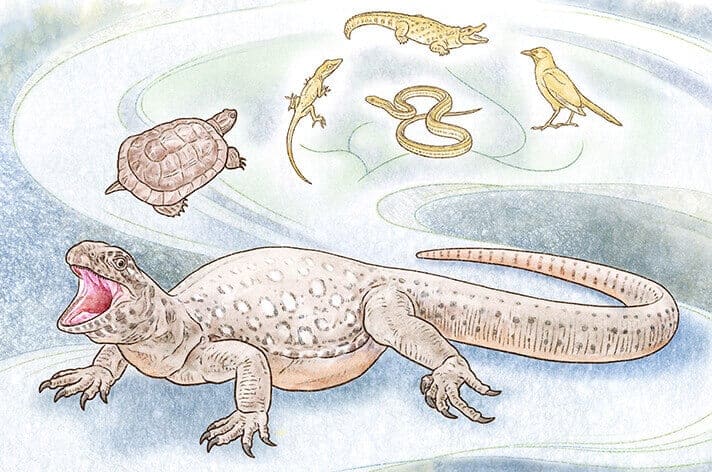There’s a twist in the turtle timeline.
Thanks to new fossil evidence, paleontologists are able to prove that turtles share a recent common ancestor with birds and crocodiles. The discovery may settle a longstanding argument among scientists about the origins of turtles.
At issue is the evolution of the turtle’s skull. Genetic analysis of molecular sequence data consistently places turtles in a group with birds and crocodilians. This would mean that early turtles had a diapsid skull, with a pair of openings behind each eye that allowed jaw muscles to tighten and flex during chewing. Yet there was no fossil evidence to confirm that position, until recently.
A group of researchers from Yale, the New York Institute of Technology (NYIT), and the Denver Museum of Nature and Science found the telltale skull openings in a juvenile example of Eunotosaurus africanus, a 260-million-year-old reptile.
“Eunotosaurus is a ‘cryptic’ diapsid because it closes the skull openings later in life,” said Bhart-Anjan Bhullar, a Yale assistant professor in the Department of Geology and Geophysics and co-author of a paper in Nature describing the finding. “Only the fortuitous discovery of these openings in a very young juvenile allowed us to realize this.”
Gaberiel Bever of NYIT is the first author of the paper. The other co-authors are Daniel Field, a doctoral candidate in the Department of Geology and Geophysics at Yale; and Tyler Lyson of the Denver Museum of Nature and Science.
“This process of apparent conflict between DNA and fossils, and eventual reconciliation through new discoveries is a great example of scientific progress, and how our knowledge of vertebrate evolution is itself continually evolving,” Field said.
If our reporting has informed or inspired you, please consider making a donation. Every contribution, no matter the size, empowers us to continue delivering accurate, engaging, and trustworthy science and medical news. Independent journalism requires time, effort, and resources—your support ensures we can keep uncovering the stories that matter most to you.
Join us in making knowledge accessible and impactful. Thank you for standing with us!

